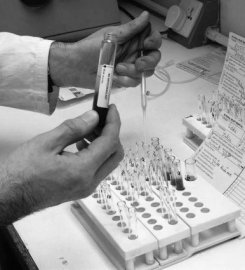 Duke University Medical Center researchers have developed a new test for identifying which strains of HIV are harbored in a patient's bloodstream. The test will allow doctors to quickly tell if drug resistance will be an issue in a patient's treatment. Drug resistance is one of the most common reasons why therapy for HIV fails. Based on genetic changes, or mutations, in HIV, the test may also help scientists understand how the constantly evolving virus develops drug resistance.
Duke University Medical Center researchers have developed a new test for identifying which strains of HIV are harbored in a patient's bloodstream. The test will allow doctors to quickly tell if drug resistance will be an issue in a patient's treatment. Drug resistance is one of the most common reasons why therapy for HIV fails. Based on genetic changes, or mutations, in HIV, the test may also help scientists understand how the constantly evolving virus develops drug resistance. HIV can be problematic to treat because its genes mutate so easily and rapidly that most people who are infected have many different forms of the virus in their bodies. And if antiretroviral therapy doesn't fully suppress the virus, a new strain that develops drug resistance will grow more quickly to become the most prominent virus in the person's body.
"The viral populations found in the blood of one patient can be very different from the populations present in another," said Duke's Feng Gao. "Which resistant viruses are at hand can have important implications for the successful treatment of that patient."
The new test works by examining the genes of HIV strains for mutations at certain positions that are known to be linked to drug resistance. Gao said that the test proved sensitive enough to detect a single mutated virus out of 10,000 non-mutated viruses in the patient samples. The test can also detect when a virus molecule has more than one mutation, a capability critical for detecting HIV strains that have become resistant to multiple drugs, a condition that occurs often as many patients are treated with many drugs at the same time.
Duke has filed for a provisional patent on the technology, and the researchers are considering ways to establish a new company to pursue its development or to license the technology. The test may find broader medical application as well, as it has the potential to detect mutations in other diseases besides HIV, such as hepatitis B, hepatitis C and tuberculosis.
Based on material from the Duke University Medical Center





